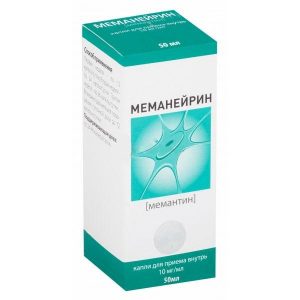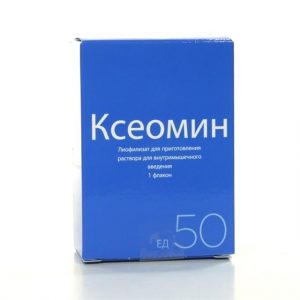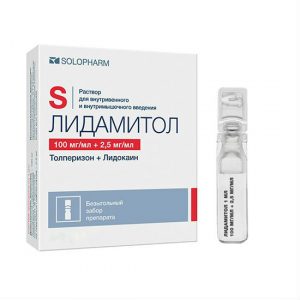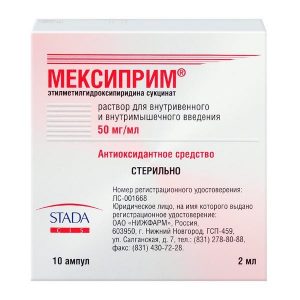Description
Latin name
Ethoxidol
Release form
Solution for intravenous and intramuscular administration.
Packing
In a package of 10 ampoules of 2 ml.
Pharmacological action
Ethoxidol is an inhibitor of free radical processes, has a membrane protective, antihypoxic, nootropic, anticonvulsant, anxiolytic effect, increases the body’s resistance to stress. Ethoxidol has anti-ischemic properties, improves blood flow in the ischemic zone, limits the area of ischemic damage, detects a lipid-lowering effect, reduces the content of total cholesterol and low density lipoproteins. The drug increases the body’s resistance to the effects of various damaging factors, to oxygen-dependent pathological conditions (shock, hypoxia and ischemia, cerebrovascular accident, intoxication with alcohol and antipsychotics (antipsychotics)).
The drug improves cerebral metabolism and blood supply to the brain, improves microcirculation and rheological properties of blood, reduces platelet aggregation. It stabilizes the membrane structures of blood cells (red blood cells and platelets) during hemolysis. The mechanism of action of the drug is due to its antioxidant, antihypoxant and membrane protective effect. It inhibits lipid peroxidation, increases the activity of superoxide oxidase, increases the ratio of lipid protein, reduces the viscosity of the membrane, increases its fluidity.
Modulates the activity of membrane-bound enzymes (calcium independent phosphodiesterase, adenylate cyclase, acetylcholinesterase), receptor complexes (benzodiazepine, GABA, acetylcholine), which enhances their ability to bind to ligands, helps to preserve the structural and functional organization of biomembranes, transport of neurotransmitters and improve synaptic transmission.
Pharmacokinetics
When administered intramuscularly, the drug is determined in blood plasma for 4 hours after administration. The time to reach maximum concentration is 0.25 hours. The maximum concentration at a dose of 100 mg is 0.3-1.06 μg / ml. Ethoxidol rapidly passes from the bloodstream to organs and tissues and is rapidly eliminated from the body. The retention time of the drug (MRT) is 1.84-2.38 hours. The half-life is 1.15-1.75 hours. Ethoxidol is excreted from the body by the kidneys, mainly in glucuronoconjugated form and in small amounts unchanged.
Indications
Acute and chronic cerebral metabolic and vascular disorders (due to atherosclerosis, hypertension, thrombosis or embolism of the cerebral vessels), including transient ischemic attack, vascular dementia and headache caused by vasospasm.
Acute and chronic (metabolic and vascular) peripheral disorders (organic and functional arteriopathies, Raynaud’s disease, syndromes caused by impaired peripheral blood flow).The atherosclerotic genesis of
anxiety disorders in neurotic and neurosis-like conditions
relief of withdrawal symptoms in alcoholism with a predominance of neurosis and vegetative-vascular disorders
acute intoxication with antipsychotics.
Contraindications
Hypersensitivity to the drug Ethoxidol or its components,
pregnancy,
lactation,
age 18 years.
Use during pregnancy and lactation
Ethoxidol is contraindicated in pregnancy and lactation, since there are no strictly controlled clinical trials of the safety of the drug during pregnancy and lactation.
Composition of
1 ml solution for intravenous and intramuscular administration contains:
active substance: ethyl methylhydroxypyridine malate (ethoxidol) 50 mg.
excipients: N-acetyl-L-glutamic acid 34 mg, deanol (2- (dimethylamino) ethanol) 16 mg, glycine 0.1 mg, disodium edetate (disodium ethylenediamine-N, N, N ‘, N’- tetraacetic acid 2-aqueous [trilon B]) 0.5 mg, water for injection up to 1.0 ml
Dosage and administration
Ethoxidol is administered intramuscularly and intravenously (in a stream or drop). With the infusion method of administration, the drug should be diluted in a 0.9% sodium chloride solution. Doses are selected individually. They begin therapy with a dose of 50-100 mg 1-3 times a day, gradually increasing to obtain a therapeutic effect. Jet ethoxidol is administered slowly for 5-7 minutes, drip at a speed of 40-60 drops per minute. The maximum daily dose should not exceed 800 mg.
In acute cerebrovascular accidents Ethoxidol is prescribed in combination therapy in the first 2-4 days intravenously (dropwise) at a dose of 200-300 mg, then 100 mg intramuscularly 3 times a day. The duration of treatment is 10-14 days.
In case of discirculatory encephalopathy in the decompensation phase, ethoxidol is administered intravenously in a drop or drop dose of 100 mg 2-3 times a day for 14 days. Then, intramuscularly, 100 mg 2 times a day for 14 days.
For the course of prophylaxis of discirculatory encephalopathy, the drug is administered intramuscularly at a dose of 100 mg 2 times a day for 10-14 days.
For mild cognitive impairment in elderly patients and anxiety disorders, the drug is administered intramuscularly in a daily dose of 100-300 mg / day for 14-30 days.
With withdrawal alcohol syndrome, ethoxidol is administered intramuscularly at a dose of 100-200 mg 2-3 times a day or intravenously drip 1-2 times a day for 5-7 days.
In acute intoxication with antipsychotics, the drug is administered intravenously at a dose of 50-300 mg per day for 7-14 days.
Side effects
Dryness,
metallic taste in the mouth,
sensations of “spreading heat” throughout the body,
unpleasant odor,
sore throat and discomfort in the chest,
feeling of lack of air (usually associated with an excessively high rate of administration and are short-term)
with prolonged use – nausea, flatulence sleep disturbances (drowsiness or falling asleep).
Drug Interaction
Enhances the effects of benzodiazepine anxiolytics, anticonvulsants (carbamazepine), antiparkinsonian agents (levodopa). Reduces toxic effects of ethyl alcohol.
Overdose
Symptoms: sleep disturbances (insomnia, in some cases drowsiness) with intravenous administration – slight and short-term (up to 1.5-2 h) increase in blood pressure.
Treatment: usually not required – symptoms disappear on their own within a day. In severe cases, with insomnia – nitrazepam 10 mg, oxazepam 10 mg or diazepam 5 mg. With excessive elevation of blood pressure – antihypertensive drugs under the control of blood pressure.
Storage conditions
In a dry, dark place at a temperature of no higher than 25 ° C.
Expiration
3 years.
Deystvuyuschee substances
tylmetylhydroksypyrydyna Malate
Terms of sale of
pharmacies Prescription
Dosage Form A dosage form
injection and infusion
Synthesis, Russian




